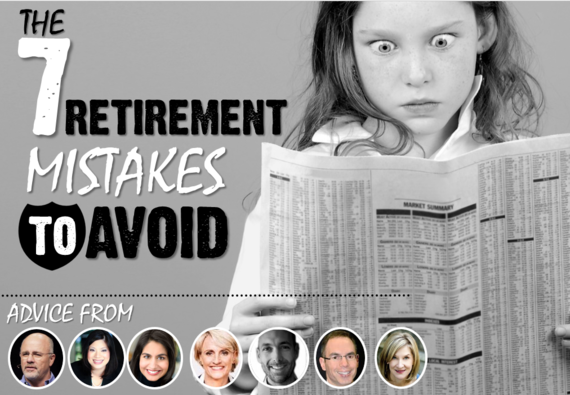As a future retiree I start from where my financial situation is today, not as I would like it to be. That I accept that fact does not in any sense undermine my future goals -- but it is necessary to begin where I am today, if I am to change it to where I want to be. That means listening and following the advice of trusted financial experts.
So after helping MoneyTips to research the "Top 30 Most Influential People in Wealth and Personal Finance," I decided to ask seven of these financial experts their advice on retirement. Their answers helped me and will help you split the retirement atom, separating retirement fact from retirement fiction.
Here's the straightforward advice they gave me:
David Ramsey, Host of the David Ramsey Show
The biggest mistake people make is they don't plan ahead. Saving for retirement isn't complicated, and it doesn't require complex financial strategies. You just have to be intentional when it comes to saving and planning for the future. It's not your employer's or the government's responsibility to make sure you have money to live on in your old age. It's up to you!
Winnie Sun of Sun Group Wealth Partners.
The most common mistake Americans make as it pertains to retirement planning is they aren't planning at all. We host workshops for employees to attend and often you won't see some attendees until the week before they leave their company.
They would have benefited from attending sooner, but life just got in the way. It goes beyond setting aside money into their company's 401k and paying down their debt, there are so many variables to retirement planning. The best course of action is to start planning when retirement isn't so near.
Meeting an adviser, you can be proactive, develop financial clarity, and have time to improve your current situation or even recover from past mistakes.
Manisha Thakor of MoneyZen Wealth Management
By far and away the biggest mistake is waiting until you are in your 40s and 50s to start thinking about it. If you start saving at that age, it can be done -- but it's a heck of a lot harder than if you start saving much smaller amounts in your 20s and 30s. For example, to have a million dollar next egg at age 65, if you assume seven percent returns, saving $5,000 a year every year from age 25 onwards will get you there. To end up at that same million dollar next egg starting at age 45 (and earning the same seven percent) will require you to save $25,000 a year.
Early on people think: It's not that much, how big a difference can it make, that feels so far off why not enjoy today, etc. But it's like sun screen. By the time you hit your 40s and 50s, it's clear who used sunscreen regularly in their 20s and 30s and who didn't. And the work you have to do to repair that damage in your 40s and 50s is a lot harder than putting on a bit of SPF 15 early on. My point, small steps early on, really are priceless.
Carolyn McClanahan: President at Life Planning Partners, Inc and Forbes Contributor
We want it all -- a great life now and security in the future. Our move toward greater consumption of products is one of the culprits. Just don't give up your safest asset too early -- your human capital (also known as "ability to work").
Bob Lotich: Personal Finance Author and Huffington Post Contributor
Far too many Americans nearing retirement don't realize that simply having a paid-off mortgage could relieve them of tremendous financial pressure. The fact is that many of us are going to fail to build a nest egg as large as we would like, but for those who fall into that category eliminating mortgage debt could provide a much more comfortable retirement. Some retirees may find themselves in a much more comfortable position by taking some of their retirement savings and using it to pay off their mortgage.
Charles Rotblut: Wealth Expert at the Wall Street Journal
The two mistakes I constantly see are a misunderstanding of what the biggest investing risk really is and underestimating how long they are investing for ("portfolio time horizon"). Many investors view risk in terms of how much money they have now relative to some point in the past or how much they might lose in the future based on expectations on what might happen.
I've also spoken to many investors who don't consider the possibility of living 30 or more years after retiring.
It's easy to understand why. Viewing risk as the loss of money from a certain number, say 25% of your current portfolio balance, is an easy concept to grasp. Similarly, it is easy to envision retiring at age 65 or 70. Abstract concepts such as a future reduction in your ability to buy goods and services ("purchasing power") or projecting your lifespan (a person in good health could realistically live past 100) are far harder to envision.
One of the key points I try to emphasize is that the true risk to an investor is not what the market will do tomorrow or even next year, but the dual possibilities of losing purchasing power and outliving your savings. This is why, when planning for retirement, investors need to think long-term and maintain a significant allocation to stocks, even in retirement. It's also why the conservative AAII portfolio allocation model suggests maintaining at least a 50% allocation to stocks.
Cathy Curtis: Investment Advisor & Financial Planner, Curtis Financial Planning, LLC
Not saving early and not saving the maximum possible. If workers would start out taking full advantage of retirement saving in the beginning of their careers, they would be so much better off without the stress and worry later on. The power of compounding interest is incredible.


